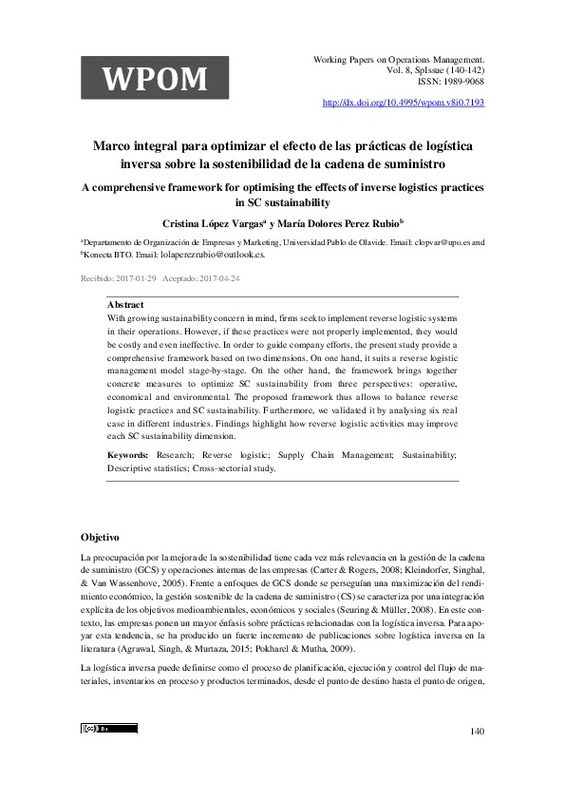JavaScript is disabled for your browser. Some features of this site may not work without it.
Buscar en RiuNet
Listar
Mi cuenta
Estadísticas
Ayuda RiuNet
Admin. UPV
A comprehensive framework for optimising the effects of inverse logistics practices in SC sustainability
Mostrar el registro sencillo del ítem
Ficheros en el ítem
| dc.contributor.author | López Vargas, Cristina
|
es_ES |
| dc.contributor.author | Pérez Rubio, María Dolores
|
es_ES |
| dc.date.accessioned | 2018-01-03T11:05:23Z | |
| dc.date.available | 2018-01-03T11:05:23Z | |
| dc.date.issued | 2017-06-07 | |
| dc.identifier.uri | http://hdl.handle.net/10251/93861 | |
| dc.description.abstract | [EN] With growing sustainability concern in mind, firms seek to implement reverse logistic systems in their operations. However, if these practices were not properly implemented, they would be costly and even ineffective. In order to guide company efforts, the present study provide a comprehensive framework based on two dimensions. On one hand, it suits a reverse logistic management model stage-by-stage. On the other hand, the framework brings together concrete measures to optimize SC sustainability from three perspectives: operative, economical and environmental. The proposed framework thus allow to balance reverse logistic practices and SC sustainability. Furthermore, we validated it by analysing six real case in different industries. Findings highlight how reverse logistic activities may improve each SC sustainability dimension. | es_ES |
| dc.language | Español | es_ES |
| dc.publisher | Universitat Politècnica de València | |
| dc.relation.ispartof | Working Papers on Operations Management | |
| dc.rights | Reconocimiento (by) | es_ES |
| dc.subject | Research | es_ES |
| dc.subject | Reverse logistic | es_ES |
| dc.subject | Supply Chain Management | es_ES |
| dc.subject | Sustainability | es_ES |
| dc.subject | Descriptive statistics | es_ES |
| dc.subject | Cross-sectorial study | es_ES |
| dc.title | A comprehensive framework for optimising the effects of inverse logistics practices in SC sustainability | es_ES |
| dc.title.alternative | Marco integral para optimizar el efecto de las prácticasde logística inversa sobre la sostenibilidad de la cadena de suministro | es_ES |
| dc.type | Artículo | es_ES |
| dc.date.updated | 2017-06-16T07:07:03Z | |
| dc.identifier.doi | 10.4995/wpom.v8i0.7193 | |
| dc.rights.accessRights | Abierto | es_ES |
| dc.description.bibliographicCitation | López Vargas, C.; Pérez Rubio, MD. (2017). A comprehensive framework for optimising the effects of inverse logistics practices in SC sustainability. Working Papers on Operations Management. 8(SP):140-142. https://doi.org/10.4995/wpom.v8i0.7193 | es_ES |
| dc.description.accrualMethod | SWORD | es_ES |
| dc.relation.publisherversion | https://doi.org/10.4995/wpom.v8i0.7193 | es_ES |
| dc.description.upvformatpinicio | 140 | es_ES |
| dc.description.upvformatpfin | 142 | es_ES |
| dc.type.version | info:eu-repo/semantics/publishedVersion | es_ES |
| dc.description.volume | 8 | |
| dc.description.issue | SP | |
| dc.identifier.eissn | 1989-9068 | |
| dc.description.references | Agrawal, S., Singh, R. K., & Murtaza, Q. (2015). A literature review and perspectives in reverse logistics. Resources, Conservation and Recycling, 97, 76-92. doi:10.1016/j.resconrec.2015.02.009 | es_ES |
| dc.description.references | Brito, M. P. de, Dekker, R., & Flapper, S. D. P. (2003). Reverse Logistics – a review of case studies Marisa. ERIM REPORT SERIES RESEARCH IN MANAGEMENT ERIM. | es_ES |
| dc.description.references | Cabral, I., Grilo, A., & Cruz-Machado, V. (2012). A decision-making model for Lean, Agile, Resilient and Green supply chain management. International Journal of Production Research, 50(17), 4830-4845. doi:10.1080/00207543.2012.657970 | es_ES |
| dc.description.references | Carter, C. R., & Ellram, L. M. (1998). Reverse logistics: a review of the literature and framework for future investigation. Journal of Business Logistics, 19(1), 85–102. | es_ES |
| dc.description.references | Carter, C. R., & Rogers, D. S. (2008). A framework of sustainable supply chain management: moving toward new theory. International Journal of Physical Distribution & Logistics Management, 38(5), 360-387. doi:10.1108/09600030810882816 | es_ES |
| dc.description.references | Dowlatshahi, S. (2009). A cost-benefit analysis for the design and implementation of reverse logistics systems: case studies approach. International Journal of Production Research, 48(5), 1361-1380. doi:10.1080/00207540802552642 | es_ES |
| dc.description.references | Fleischmann, M., Bloemhof-Ruwaard, J. M., Dekker, R., van der Laan, E., van Nunen, J. A. E. E., & Van Wassenhove, L. N. (1997). Quantitative models for reverse logistics: A review. European Journal of Operational Research, 103(1), 1-17. doi:10.1016/s0377-2217(97)00230-0 | es_ES |
| dc.description.references | Kleindorfer, P. R., Singhal, K., & Wassenhove, L. N. (2009). Sustainable Operations Management. Production and Operations Management, 14(4), 482-492. doi:10.1111/j.1937-5956.2005.tb00235.x | es_ES |
| dc.description.references | Pokharel, S., & Mutha, A. (2009). Perspectives in reverse logistics: A review. Resources, Conservation and Recycling, 53(4), 175-182. doi:10.1016/j.resconrec.2008.11.006 | es_ES |
| dc.description.references | Rogers, D. S., & Tibben-Lembke, R. S. (1999). Going backwards: reverse logistics trends and practices. Pittsburgh, PA: Reverse Logistics Executive Council. | es_ES |
| dc.description.references | Seuring, S., & Müller, M. (2008). From a literature review to a conceptual framework for sustainable supply chain management. Journal of Cleaner Production, 16(15), 1699-1710. doi:10.1016/j.jclepro.2008.04.020 | es_ES |








